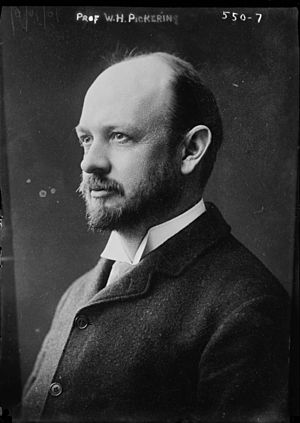William Henry Pickering facts for kids
Quick facts for kids
William Henry Pickering
|
|
|---|---|

Pickering in 1909
|
|
| Born | February 15, 1858 |
| Died | January 16, 1938 (aged 79) Mandeville, Jamaica
|
| Education | Massachusetts Institute of Technology (1897) |
| Relatives | Edward Charles Pickering |
| Awards | Lalande Prize (1905) Prix Jules Janssen (1909) |
| Scientific career | |
| Fields | Astronomy |
William Henry Pickering (born February 15, 1858 – died January 16, 1938) was an American astronomer. He was a scientist who studied space.
Pickering helped build and set up several observatories. These are places where scientists watch the stars and planets. One famous observatory he helped with was Percival Lowell's Flagstaff Observatory.
He also led trips to study solar eclipses. He looked closely at craters on the Moon. He even thought that changes in the Moon's crater called Eratosthenes might be caused by "lunar insects"!
Later in his life, he spent a lot of time at his own private observatory. This observatory was in Jamaica.
Contents
About William Pickering
William Pickering was born in Boston, Massachusetts, on February 15, 1858. His older brother, Edward Charles Pickering, was also a famous astronomer. Edward was in charge of the Harvard College Observatory for 30 years.
William went to the Massachusetts Institute of Technology. He graduated in 1879. After that, he taught physics there from 1880 to 1887.
A Love for Hiking
Throughout his life, Pickering loved to hike and climb mountains. He was one of the first members of the Appalachian Mountain Club. This club started in 1876.
In 1882, he wrote a book called Walking Guide to the Mt. Washington Range. Many people think this was the first modern hiking guide in America. The book had a map of the trails. This was probably the first trail map ever published for the White Mountains.
In 1883, when he was just 25 years old, he became a Fellow of the American Academy of Arts and Sciences. This was a big honor for a young scientist.
Discoveries in Space
In 1899, Pickering discovered Saturn's ninth moon. He found it by looking at photos taken in 1898. He named this moon Phoebe.
In 1903, he created a photo book of the Moon. It was called The Moon : A Summary of the Existing Knowledge of our Satellite.
He thought he found a tenth moon of Saturn in 1905. He called it "Themis". He even won an award for this discovery, the Lalande Prize. However, scientists later found out that "Themis" did not actually exist.
Ideas About Earth and Moon
In 1907, Pickering had an idea about how the Moon formed. He thought the Moon was once part of Earth. He believed it broke away from where the Pacific Ocean is now. This idea was similar to what another scientist, George Darwin, had suggested.
Pickering also had an early idea about continental drift. This is the idea that Earth's continents move over time. He thought that America, Asia, Africa, and Europe were once one big continent. He believed they broke apart when the Moon separated from Earth.
Looking to the Future
In 1908, Pickering talked about airplanes, which had not been invented yet. He said it was a "popular fantasy" to think that flying machines could drop bombs in wartime. This shows how people were thinking about new technologies even before they existed.
In 1919, he predicted there was a "Planet X" beyond Neptune. He thought this planet was pulling on Uranus and Neptune, changing their paths. Scientists looked for it using photos from the Mount Wilson Observatory, but they didn't find it.
Later, in 1930, Pluto was discovered by Clyde Tombaugh. It was found at the Flagstaff Observatory, which Pickering had helped set up. However, Pluto is too small to affect Uranus or Neptune. Today, we know that the earlier calculations about Uranus and Neptune's paths were not perfectly accurate. When Pluto was named, Pickering thought its symbol looked like a combination of his and Lowell's initials.
In 1921, he claimed to have found signs of plants growing on the Moon.
William Pickering retired from Harvard University in 1923. He passed away on January 16, 1938, in Mandeville, Jamaica.
Awards and Honors
William Pickering received several important awards for his work.
- He won the Prix Lalande in 1905.
- He also won the Prix Jules Janssen in 1909.
An asteroid called 784 Pickeringia is named after him. Also, two craters are named after him and his brother Edward. One is Pickering on the Moon, and the other is Pickering on Mars.
See also
 In Spanish: William Henry Pickering para niños
In Spanish: William Henry Pickering para niños
 | Roy Wilkins |
 | John Lewis |
 | Linda Carol Brown |

